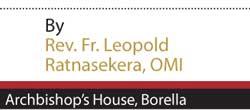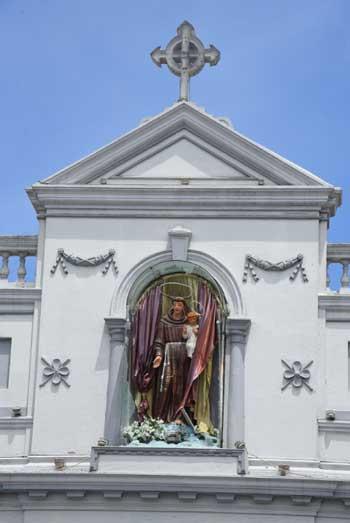Reply To:
Name - Reply Comment
A disgraceful and greedy scramble for political power has dirtied the noble ideals of democracy ...
 Brazen contradictions both in national politics and the exercise of the franchise as well as in civic life have marked the tragic national history of the Sri Lankan nation with vengeance during the last post-Independence 70-year span.
Brazen contradictions both in national politics and the exercise of the franchise as well as in civic life have marked the tragic national history of the Sri Lankan nation with vengeance during the last post-Independence 70-year span.
The hartals of the late fifties with the Sinhala Only policy brought in the first taste of modern ethnic tensions. Then came the unsteady political situations of the sixties prefaced by nationalizing policies, the take over all denominational schools in 1960 creating a lot of difficulties especially to the educational institutions run by the Christians. A sad economic down-turn plunged the nation in chaos .in the seventies through a new Constitution was hailed in 1972 in fulfilment of an election pledge, Youth dissatisfaction and anger at discrimination in education and employment opportunities especially for the poor rural youth ignited a disturbing insurrection at the dawn of the seventies. The eighties brought in a new wave of politics with an open economy of free trade zones and a new constitution that introduced an Executive Presidential system of democracy to the country. Some political analysts see in this a great bane to the nation’s journey into the future.
 Factions breaking up within the major political parties and a series of assassinations took place followed by a disastrous ethnic war soaking the island with a bloodbath for three long decades until 2009. The terrorist rebels desired an independent area of land for themselves with the right of autonomous rule plus equal opportunities in education and employment. Ethnic ideology rippled also into a diaspora overseas which still is very much alive in their demands for autonomy. They were decrying the slow pace of development in their part of the country. The thirty-year war was a great national tragedy second only to the colonial invasions of the pre-independence era Signs of contradiction appear unabated
Factions breaking up within the major political parties and a series of assassinations took place followed by a disastrous ethnic war soaking the island with a bloodbath for three long decades until 2009. The terrorist rebels desired an independent area of land for themselves with the right of autonomous rule plus equal opportunities in education and employment. Ethnic ideology rippled also into a diaspora overseas which still is very much alive in their demands for autonomy. They were decrying the slow pace of development in their part of the country. The thirty-year war was a great national tragedy second only to the colonial invasions of the pre-independence era Signs of contradiction appear unabated
Except for very brief periods of relative peace, calm and harmony as well as moments of economic prosperity, the story of Sri Lanka simply leaves much to be desired. Was it a never-ending series of signs of contradiction swinging the country and its hoi-polloi between democracy and oligarchy, prosperity and adversity, war and peace, tension and calm! In between these episodes, ethnic tensions have often marked the instability of the nation while all the way, despite grandiose development projects buttressed by huge borrowings from monetary agencies and donor nations, the country has been pinned down in the dumps of national and international debt going into billions of dollars! As to when will we ever be liberated from the chains and shackles of these oppressive debts, is an anxious question that should worry all future leaders at the helm in this country. Though apparently on the way to political stability and economic prosperity, the nation now faces another frightening wave of terrorism which appears religiously extremist oozing from radical Islamic terrorism which indeed is global.
As far as the Catholic community is concerned the inhumane, barbaric, dastardly and despicable acts of terror unleashed in the murder of the innocents were perpetrated in two churches dedicated to two most popularly venerated saints of the island: St Anthony and St Sebastian. The shrine in Kochchikade in Colombo is frequented not only by Catholics but religionists of other faiths as well such as Hindus and Buddhists. They flock there to plead with the saints for material and spiritual favours. How could such a shrine sacred to both Catholics and non-Catholics go up in flames becoming in an instant a place of horror, a cold-blooded murder scene in a Church ignited by a deranged and misguided religious youth? Yet, it was possible! The Church at Katuwapitiya saw another devout Catholic community of worshippers who had gathered to celebrate the most important Christian festival of Easter, the feast of the Risen Lord Jesus Christ. That Easter morn had, by contrast, turned the clock back into the gloom, pain, suffering and death of Good Friday: a veritable Golgotha. The crucifixion of the Redeemer took place again in the heart of a congregation. It was the followers of the Risen Lord who were thus sacrificed near the altar while they were sitting in devout contemplation and prayer as the morning service was about to end. So was the sign of contradiction in another Community in worship. We do not forget the helpless tourists in the three hotels who were dreaming of basking in the beautiful beaches of Sri Lanka, enjoy the salubrious mountains of the hill-country, taste local menus and admire the ancient ruins that tell the glorious tale of the island’s history. They spilt their blood too on our soil.
Signs of Hope
In the past post-independence era of our beloved country, there had been many good things to be proud of such as the democratic way of life we have lived, the colossal feats of economic achievement in agriculture, roads and transport and the flowering of our religious values in the various living religious traditions we possess amongst our citizens. There are so many beautiful cultural traits in our family traditions, inter-cultural harmony, the plethora of fine arts and architecture and the immense wealth of talent in various fields. We have free education and free health-care and the freedom to practice our religions, the freedom to hold different political views, the typical sense of Sri Lankan hospitality and friendliness, hard work of our tea-estate workers, of rural populations, the farmers, craftsmen and migrant workers in Europe and in the Middle-East. Of these, we can be legitimately proud. They are dynamic signs of the goodness and beauty of our island’s landscape: gems in our crown.
But, much to our regret, they are often barred and blackened by signs of contradiction which cannot be compounded at all with the best of ideas that we profess and the profundity of our ethics and ethos. And so, violence had stalked our land in despicable ways due to various socio-cultural and political reasons: issues that still beg for definitive and clear responses.
Conclusion
With periodic short spells of peace and quiet, the trail of violence has gone unabated erupting in hartals, trade union strikes, religious and ethnic tensions, youth insurrections, demonstrations by university students, thirty-year terrorist ethnic war and now the fact of having to live with global terrorism that has taken us all by shock and surprise.
A disgraceful and greedy scramble for political power has dirtied the noble ideals of democracy and good governance. Vested interests have produced politicians who by all standards fail to measure up to the noble stature of statesmen and servants of the people.
As a result of extremisms of ethnic and religious nature that is a travesty of patriotism, many a calamity has fallen on the poor citizens who see trust being betrayed and breached by the highest echelons in society and in seats of government. There is a loss of credibility in democratic institutions. Rampant bribery and corruption have stained the purity of our political culture, the noble profession it is! These are some of the sad aspects of our recent history from which we as a nation are still slow and unable to learn changing course for the better. It is hoped that these signs of contradiction would soon be transformed into emblems of hope, transparency and good fortune based on truth and justice and that the nation could well look forward beyond these tragedies however regrettable and sad they are, to an era of prosperity, national unity and peace. This sense of optimism could still trust and rely on the silver lining that paradoxically graces the dark clouds over our horizons at the moment.